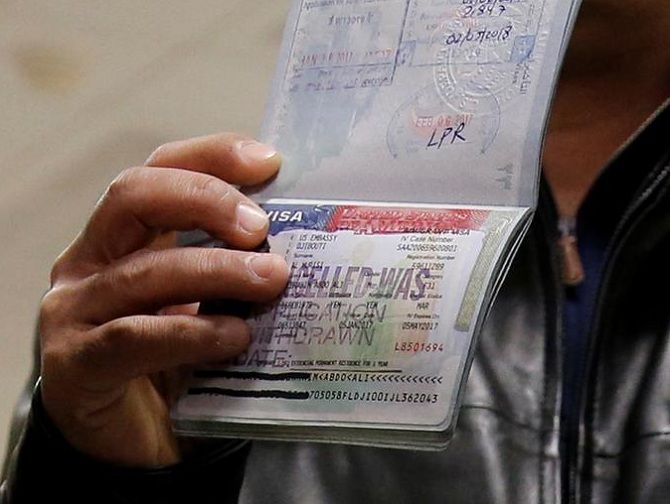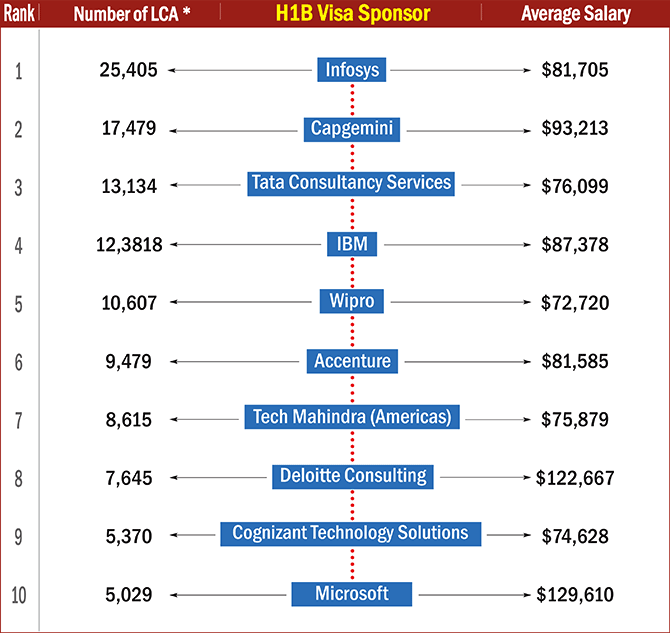Amid Donald Trump's expected action against employment visas, India's bellwether IT firms reveal they have been preparing for this eventuality for years.
Monali Sarkar surveys the Indian IT landscape.

Photograph: Jonathan Ernst/Reuters
While the threat of an overhaul of the H-1B work-visa programme has become more pronounced since Donald Trump was sworn in as the president of the United States on January 20, the biggest names in India's information technology sector have been preparing for this for a long time.
Under pressures of profitability, threat of lawsuits (Oracle has been sued for discriminatory hiring practices against White, Hispanic and African Americans in favour of Asians, particularly 'Asian Indians'), and hurting stock prices (TCS shares fell 4.47%, Infosys' 2% and Wipro's 1.62% on January 31 on the back of H-1B rumours) all of the top IT firms have revealed how they have been bracing themselves for a tightening of the employment laws for years.

Graphic: Satish Bodas/Rediff.com
TCS
Tata Consultancy Services, India's largest IT outsourcing company, had begun tightening its use of the H-1B visa much before Trump's election, N Chandrasekaran, the company's outgoing CEO and Tata Sons' chairman-designate, revealed while announcing the company's Q3 results last month.
The company, Chandrasekharan said, had applied for only 4,000 new US visas in 2016, as against 14,000 in 2015; it was granted only around 1,300.
TCS, Chandrasekaran added, had been addressing the commentary about the increase in the visa fee as well as the visa numbers 'very proactively.'
'In terms of the number of visas that we will get,' he elaborated, 'we decided more than a year ago that we have to operate in a visa-constraint regime. We are able to successfully execute (our orders) by making changes to our business model. So, we believe that we are preparing ourselves well to handle the headwind should it arise.'
According to a December note prepared by Investec Securities, an increase in minimum annual wage to $110,000 for H-1B workers may hurt TCS' gross margin by 230 basis points.
Infosys
As early as April 2016, Infosys CEO Vishal Sikka had told Business Standard, 'It's the year of presidential elections in the US, and we continue to be influenced in the near term by the visa situation. Our view is to become independent of visas and hire locally.'
'I am a local hire in the US and we have thousands of people hired locally working in the US, Europe, Australia and other places. Our effort is to get independent of this visa as much as possible and I believe it's possible to achieve that. We believe this idea of a location independent experience of delivery is something in our reach because of technology.'
The company is setting up 'region-specific hubs' to hire freshers and experienced young professionals in the US and Europe to combat growing anti-immigration policies of local governments.
Ravi Kumar S, who has been elevated as Infosys' deputy chief operating officer, recently told investors, 'We started hiring freshers from US campuses in the past couple of years, so that will continue. Our focus is to hire locals and supplement skills, which are not available with the visa programme. We are also looking for setting up specific hubs, which we have experimented with in the last couple of years.'
Infosys Co-founder N R Narayana Murthy also spoke about this recently.
'They (Indian software companies) must recruit American residents in the US, Canadians in Canada, British people in Britain etc. That's the only way, we can become a true multinational company and in order to do that, we should stop using H1-B visas and sending a large number of Indians to those countries to deliver services,' he told NDTV.
If Trump does issue an executive order restricting the use of H-1B, Murthy said, 'we should look at it more as an opportunity for Indian companies to become more multi-cultural than we have been, rather than looking at it as a lacuna.'
According to a December note prepared by Investec Securities, an increase in minimum annual wage to $110,000 for H-1B workers may hurt Infosys' gross margin by 170 bps.
Wipro
Wipro CEO Abidali Z Neemuchwala told NDTV at the World Economic Forum meeting in Davos last month that the company had been preparing for the H-1B headwinds for a while by hiring locally and investing in delivery and innovation centres in the US.
Noting that Wipro has been associated with many US schools and universities to boost its local hiring, he said, 'We could have hired more (in the US) if got STEM (science, technology, engineering and mathematics) educated campus recruits in the US.'
But he added, 'Wipro as part of the Indian IT industry, spearheaded by Nasscom, is participating in representing what we believe is a fair opportunity to compete in any market. We will continue to pursue that.'
Neemuchwala expressed confidence that the Indian IT industry could handle this challenge.
'I have been with this industry for 25 years. We had different challenges across these 25 years. Every challenge has brought an opportunity. Indian IT industry has been very agile in terms of being able to evolve into something completely different and new,' he told NDTV.
'This is the time for great transformation for the industry,' he said.
Wipro HR head Saurabh Govil told The Times of India, 'The focus the industry had on hiring will shift into re-skilling. The entire industry is hiring fewer freshers. Given the macro environment, people are hiring more onsite. Jobs at the bottom of the pyramid are getting automated.'
Cognizant
Cognizant, which has about 70 to 75 per cent of its over 200,000 workforce based out of India, said it hired over 4,000 US citizens and residents in 2016 and that it is planning to 'significantly increase' the size of its US workforce in the coming years.
'As you know, there has been considerable discussion recently on the topic of skilled immigration in the US. This has been an ongoing discussion for many years,' the Press Trust of India quoted Cognizant President Rajeev Mehta as saying.
'The plan we have announced (for ramping up digital services offering) will require us to continue to build our team in the US and in other geographies around the world where we operate,' Mehta added.
'Consistent with this need, we continue to focus on taking steps to ensure that we have access to a robust supply of talent in the US.'
The company has built a network of over 20 US-based delivery centres and plans to add additional capacity in 2017.
The US accounts for a significant chunk of the global IT spending. For Cognizant, North America contributed over 78 per cent of its December quarter revenues.
HCL
HCL Technologies, India's fourth largest software exporter, too said it already had 'stepped up' efforts in the US for campus and entry-level hires.
'We have really looked at our current base of employees and looked at how local hiring can be ramped up... We are stepping up our campus and entry -- level hiring in the US to support some of the growth that we will see in coming quarters,' HCL Technologies President and CEO C Vijayakumar told the media last month.
HCL, he noted, has been applying for 'less than 1,000 visas a year' on an average over the past 3 to 4 years.
'It has been coming down. Our strategy has been in all IT outsourcing deals, we re-badge a lot of people from our clients and we hire people from local geographies. So, that's why we have a very high percentage of our employees in the US who are local hires.'
Without disclosing the exact figure, Vijayakumar said HCL currently recruits over 55 per cent local employees in the US.










